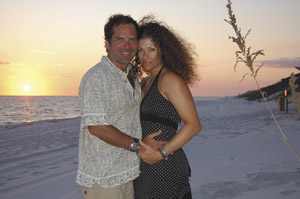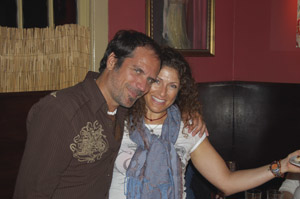On Nov. 26, 2008, Santos Lopez was brining a Thanksgiving turkey in his mother's kitchen in Lexington, Ky., when his cell phone rang. His hands were slick with grease, but he managed to fish out his phone. Instantly, he knew something was wrong. "Boo," came the shaky voice on the line. "I've been shot."
Santos listened, and when his wife hung up he was proud for remaining calm. That's when he realized, sometime during the call, he had crumpled to his knees.
He did not know it at the time, but he had just received one of the first inklings on American soil of a ghastly crime a world away, in Mumbai, India. Over the days to come, its magnitude would become horrifically familiar: an unthinkable planned assault, mass casualties, a bustling megapolis paralyzed by fear and grief.
But at that moment, Santos Lopez's only concern was one woman, a single pinpoint on the other side of the earth. He would not stop until he reached her.
"The beloved," he calls her—so often, and so naturally, that when news reports began to surface that a Nashville woman named Rudrani Devi had been shot execution-style, as part of a terrorist attack on a luxury hotel in Mumbai, some of his friends didn't make the connection. Still others didn't recognize Rudrani as Andi Varagona, a longtime Nashville video producer who took the name ("one who takes away others' pain") as part of her spiritual focus.
But their romance was legend, even beyond their circle of friends—who ranged from staff at CMT, where Santos works as a producer, to Rudrani's celebrity clientele as a spiritual instructor. There was the night on the beach at Florida's St. George Island. A glowing sun was setting on the Gulf, and Santos sent Rudrani to fetch something from their car. She returned in time to see a bottle bobbing in the surf. The map inside led her to an object buried in the sand: a book handmade by Santos. Every page charted what had brought them to this spot, this night. On the last page, hidden in a walnut shell, was an engagement ring.
They had been in each other's orbit without knowing since the 1980s, when the Venezuela-born Santos was a spike-haired fixture in Nashville rock clubs and Andi fronted an all-girl rock combo called the Paper Dolls. As a couple, they were now so close that from the moment Rudrani left for India, Santos wore two watches, one with his time, the other reading her time in Mumbai. He would have been with her, had he been able to get off work.
Instead, he was spending a hasty Thanksgiving in Lexington as Rudrani was just sitting down to a late-evening meal with friends, around 10 o'clock in Mumbai's Trident-Oberoi Hotel. Rudrani, who has practiced meditation for 25 years, had gone to Mumbai with members of the Synchronicity Foundation, the Virginia-based spiritual community led by her own instructor, Master Charles Cannon.
She spent the day in sessions, then joined five members of her group downstairs in the hotel restaurant. There was Linda Ragsdale, the Nashville children's-book author who had taken Santos' place. There was Michael Rudder, a Canadian actor, and a Canadian yoga instructor named Helen Connelly. There was Alan Scherr, a former art professor from Virginia, and his 13-year-old daughter Naomi.
You would expect Rudrani to remember what happened next with tears and hysterics, or to block the memory altogether. She was struck recently by a news report that described the mental processes of people under terrorist attack—that because the brain seizes upon previous experiences (e.g., touching a hot stove) to respond in the moment, terrorist victims tend to freeze because their minds have no earlier frame of reference.
That is not the case with Rudrani Devi.
"I remember everything everybody ate," Rudrani says. Even with her fractured leg propped, as it is every day, on a plump red pillow in her South Nashville living room, she and Santos make a glamorous, mischievous couple. They talk literally gazing into each other's eyes. "I remember the conversations: I even remember what everybody said," she continues. "I remember hearing Helen doing mantra. I was doing my mantra silently."
Just as clearly, she remembers hearing gunfire in the distance. Had she known, she says, about India's relatively strict gun laws—an issue that would come up again during her medical treatment—she would have been more concerned. Just as their food arrived, about 10:10 p.m., she heard the gunfire in the building.
"I said, 'We all have to get under the table, now,' " Rudrani says, with the clarity of someone describing a movie. "So we all got under the table. There were six of us. And then they were firing."
Someone would later tell Rudrani the assassins looked like "kids with school backpacks." She herself never saw them. The first to be shot was Rudder, who had done voiceover work on the Splinter Cell videogame. As Rudrani remembers, he seemed initially to regard his wounds with puzzlement, as if expecting fake blood, until he collapsed. That may have saved his life. Under the table, the others tried to reach "stillness"—basically, to play dead. Lying next to Alan Scherr, Rudrani put her hand on the back of his neck, to get his attention. Then she ducked her own head.
Scherr was executed. He died immediately, as did his daughter, with whom Rudrani had been joking about her food just moments before. Rudrani accepted that she too was dying. She was at peace. "I'm right with God," she thought. Just then, she was jolted back by an ear-splitting din. The assassins were machine-gunning the hotel's elaborate glass fountain.
From the nearby kitchen doorway, a member of the kitchen staff hissed, "If you want to live, you need to come now." Rudrani's right hand wouldn't work. "Drag me!" she called—and to her inexpressible gratitude, the staffer bolted from the doorway, grabbed her wrist and pulled her 15 feet to safety. The attack was so fresh that as the man dragged her, still-hot shell casings seared marks into her flesh.
With Rudrani lying in blood, the survivors pressed a chair up under the kitchen's doorknob. Above the liquor shelf, a large window suddenly shattered from gunfire. Rudrani heard something skitter across the floor, then heard the ttt-ttt-ttt of a trigger mechanism two feet from her face.
"Live grenade," she said. She couldn't move. She told everyone to go.
Instead, the men hoisted her into a chair position, and the group hurtled down the steps to the exit. As soon as they arrived downstairs, they found the door locked tight. The key lay with a manager, dead upstairs. A staffer hurled himself at the door, so hard Rudrani thought he would break his shoulder. The door crashed open. The four survivors in her party, all bloodied, somehow managed to pile into a taxi and escape.
For Rudrani, bleeding profusely and not sure she would make it, there was only one thing left to do. A world away, in Lexington, Ky., a cell phone rang.
It would take Santos Lopez 48 hours after that call to reach Rudrani's side. His nieces kept him apprised as news broke; his sisters became makeshift travel agents—no small feat on Thanksgiving day. Then there was the matter of his passport, which was in Nashville. With true ingenuity, everyone found a way that Linda Ragsdale's husband Ben, who was leaving from Nashville, could hook up with Santos in Baltimore for the 19-hour overseas flight. Looming as an even greater nightmare was obtaining an on-the-spot visa to visit terrorist-stricken India—again, on Thanksgiving day, with government offices closed.
And yet one day later, on Nov. 28, Santos was en route to her hospital, passing through the eerily deserted streets of one of the world's most congested cities. He made his way to Room 34, he remembers, bracing himself for the worst—but "she's looking all fresh and beautiful," he says, to which Rudrani rolls her eyes. She saw him walk in, so far from home, and he said, "You wished me here."
They remained in the Mumbai hospital for 12 days. The terrorists had shot Rudrani twice, point-blank, with an AK-56. One bullet entered her right arm, just below her shoulder, and she pulls back her sleeve to show where it ripped through her triceps. Another bullet entered her right thigh, and still another burned her neck. Her Indian doctors, unaccustomed to treating gunshot wounds, made curious incisions that she regards more with amusement than dismay.
Worse, the bullet that hit her thigh chipped her femur, a tiny nick that went unnoticed for weeks. It developed into a serious stress fracture that ran the length of the bone, and only treatment by Titans orthopedic specialist Dr. Burton Elrod averted severe injury. At her lowest ebb, unable to perform yoga or muster her psychic energy, wracked by pain and wounds that were not healing, she prepared herself for bone surgery she dreaded mightily.
The night before the planned procedure, a sense of intense warmth awakened her. She could feel her body regenerating, with a force she hadn't felt since the attack. Not only did she avoid surgery, her leg is healing more rapidly than anyone expected.
The attack continues to affect Rudrani and Santos' life in ways large and small. The couple's insurance did not cover the out-of-country medical expenses, and just last week Rudrani was forced to close her small clinic for spiritual instruction. (A fund has been set up to meet her expenses: Visit rudranidevi.com for more information.)
But the two seem anything but despondent. They giggle over scrapbook photos of their outlandishly elaborate Halloween costumes—Zorro!—and a glimpse of Rudrani's sky-high '80s hairdo, back when she was a state champion bodybuilder. They address one another with unabashed tenderness.
Above all, they refuse to be held captive by thoughts of vengeance. Rudrani says she forgave whoever shot her the night it happened. Santos, despite the immediate fury in his "Latin alpha male blood," eventually followed the lead of her compassion. His main regret, he says, is that he vowed at their wedding to protect her, and wasn't there in her moment of need.
She says he was. A month after the attack, when her spirits were low, Santos forced her to go to a nearby mall. He wheeled her into a clothing store and made her buy the kind of little black dress she always rocked. They crashed and staggered into the dressing room until they found one that showed off her yoga-toned body. Now, every month on the anniversary of the attack, they plan to go out. Just a few weeks ago, Andi Varagona, 45, celebrated her second birthday.
"I am well," Santos Lopez says, "other than every time she calls, my heart stops. And then it goes back to tickin'. "






